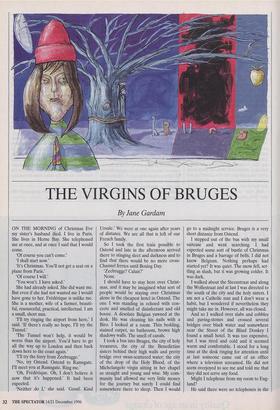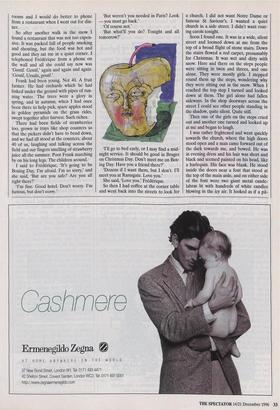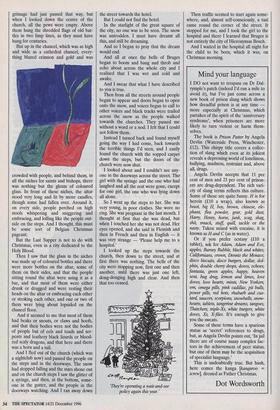THE VIRGINS OF BRUGES
By Jane Gardam
ON THE MORNING of Christmas Eve my sister's husband died. I live in Paris. She lives in Herne Bay. She telephoned me at once, and at once 1 said that I would come.
'Of course you can't come.'
'I shall start now.'
'It's Christmas. You'll not get a seat on a plane from Paris.'
'Of course I will.'
'You won't. I have asked.'
She had already asked. She did want me. But even if she had not wanted me I would have gone to her. Frederique is unlike me. She is a mother, wife of a farmer, beauti- ful, resourceful, practical, intellectual. I am a small, short nun.
'I'll try ringing the airport from here,' I said. 'If there's really no hope, I'll try the Tunnel.'
'The Tunnel won't help, it would be worse than the airport. You'd have to go all the way up to London and then back down here to the coast again.'
'I'll try the ferry from Zeebrugge.'
'No, try Ostend. Ostend to Ramsgate. I'll meet you at Ramsgate. Ring me.'
'Oh, Frederique. Oh, I don't believe it now that it's happened.' It had been expected.
'Neither do I,' she said. `Gentil. Kind Ursule.' We were at one again after years of distance. We are all that is left of our French family.
So I took the first train possible to Ostend and late in the afternoon arrived there to stinging sleet and darkness and to find that there would be no more cross- Channel ferries until Boxing Day.
'Zeebrugge? Calais?'
None.
I should have to stay here over Christ- mas, and it may be imagined what sort of people would be staying over Christmas alone in the cheapest hotel in Ostend. The one I was standing in echoed with con- crete and smelled of disinfectant and old booze. A desolate Belgian yawned at the desk. He was cleaning his nails with a Biro. I looked at a room. Thin bedding, stained carpet, no bathroom, brown high shadowy walls. The smell of canals.
I took a bus into Bruges, the city of holy treasures, the city of the Benedictine sisters behind their high walls and pretty bridge over swan-scattered water; the city of the drop of the Holy Blood, of the Michelangelo virgin sitting in her chapel so straight and young and wise. My com- munity had allowed me very little money for the journey but surely I could find somewhere there to sleep. Then I would go to a midnight service. Bruges is a very short distance from Ostend.
I stepped out of the bus with my small suitcase and went searching. I had expected some sort of bustle of Christmas in Bruges and a barrage of bells. I did not know Belgium. Nothing perhaps had started yet? It was quiet. The snow fell, set- tling as slush, but it was growing colder. It was dark.
I walked about the Steenstraat and along the Wollestraat and at last I was directed to the south of the city and the holy sisters. I am not a Catholic nun and I don't wear a habit, but I wondered if nevertheless they might take me in. However, all was closed.
And so I walked over slabs and cobbles and paving-stones and crossed several bridges over black water and somewhere near the Street of the Blind Donkey I found a small hotel. It was too expensive, but I was tired and cold and it seemed warm and comfortable. I stood for a long time at the desk ringing for attention until at last someone came out of an office where a television screamed. He did not seem overjoyed to see me and told me that they did not serve any food.
Might I telephone from my room to Eng- land?
He said there were no telephones in the rooms and I would do better to phone from a restaurant when I went out for din- ner.
So after another walk in the snow I found a restaurant that was not too expen- sive. It was packed full of people smoking and shouting, but the food was hot and good and they sat me in a quiet corner. I telephoned Frederique from a phone on the wall and all she could say now was `Genta Gent-a,' again and again and again. 'Genii!, Ursule, gentil.' Frank had been young. Not 40. A fruit farmer. He had orchards which he had linked under the ground with pipes of run- ning water. The trees were a glory in spring, and in autumn, when I had once been there to help pick, spare apples stood in golden pyramids on the grass rides, swept together after harvest. Such riches. There had been fields of strawberries too, grown in trays like shop counters so that the pickers didn't have to bend down, and we had all stood at the counters, about 40 of us, laughing and talking across the field and our fingers smelling of strawberry juice all the summer. Poor Frank marching by on his long legs. The children around. I said to Frederique, 'It's going to be Boxing Day, I'm afraid. I'm so sorry,' and she said, 'But are you safe? Are you all right there?' 'I'm fine. Good hotel. Don't worry. I'm furious, but don't wony.' 'But weren't you needed in Paris? Look — you must go back.'
'Of course not.'
'But what'll you do? Tonight and all tomorrow?'
'I'll go to bed early, or I may find a mid- night service. It should be good in Bruges on Christmas Day. Don't meet me on Box- ing Day. Have you a friend there?'
'Dozens if I want them, but I don't. I'll meet you at Ramsgate. Love you.'
She said, 'Love you.' Frederique.
So then I had coffee at the corner table and went back into the streets to look for a church. I did not want Notre Dame or famous St Saviour's. I wanted a quiet church in a side street. I didn't want roar- ing carols tonight.
Soon I found one. It was in a wide, silent street and loomed down at me from the top of a broad flight of stone stairs. Down the stairs flowed a red carpet, presumably for Christmas. It was wet and dirty with snow. Here and there on the steps people were sitting in twos and threes, and one alone. They were mostly girls. I stepped round them up the steps, wondering why they were sitting out in the snow. When I reached the top step I turned and looked down at them. The girl alone had fallen sideways. In the shop doorways across the street I could see other people standing in the shadow, quite silent. Quite still.
Then one of the girls on the steps cried out and another one turned and looked up at me and began to laugh.
I was rather frightened and went quickly towards the church, where the high doors stood open and a man came forward out of the dark towards me, and bowed. He was in evening dress and his hair was short and black and seemed painted on his head, like a harlequin. His face was blank. He stood inside the doors near a font that stood at the top of the main aisle, and on either side of the font were two giant metal cande- labras lit with hundreds of white candles blowing in the icy air. It looked as if a p11- grimage had just passed that way, but when I looked down the centre of the church, all the pews were empty. Above them hung the shredded flags of old bat- tles in two limp lines, as they must have hung for centuries.
But up in the chancel, which was as high and wide as a cathedral chancel, every- thing blazed crimson and gold and was crowded with people, and behind them, in all the niches for saints and bishops, there was nothing but the gleam of coloured glass. In front of these niches, the altar stood very long and lit by more candles, though some had fallen over. Around it, on every side, people perched on high stools whispering and sniggering and embracing, and lolling like the people out- side on the steps. And I thought, this must be some sort of Belgian Christmas pageant.
But the Last Supper is not to do with Christmas, even in a city dedicated to the Holy Blood.
Then I saw that the glass in the niches was made up of coloured bottles and there were more bottles on the altar, some of them on their sides, and that the people sitting round the altar were using it as a bar, and that most of them were either drunk or drugged and were resting their heads on the altar or embracing each other or stroking each other, and one or two of them were lying about lopsided on the chancel floor.
And it seemed to me that most of them had beaks or snouts, or claws and hoofs, and that their bodies were not the bodies of people but of eels and toads and ser- pents and leathery black lizards or blood- red scaly dragons, and that here and there was a horn and a tail.
And I fled out of the church (which was a nightclub now) and passed the people on the steps and in the doorways. The snow had stopped falling and the stars shone out and on the church steps I saw the glitter of a syringe, and then, at the bottom, some- one in the gutter, and the people in the doorways watching. And I ran away down the street towards the hotel.
But I could not find the hotel.
In the starlight of the great square of the city, no one was to be seen. The snow was untrodden. I must have dreamt all this, and still be dreaming.
And so I began to pray that the dream would end.
And all at once the bells of Bruges began to boom and bang and throb and echo about across the whole city and I realised that I was wet and cold and awake.
And I swear that what I have described to you is true.
Then from all the streets around people began to appear and doors began to open onto the snow, and voices began to call to other voices and black tracks were trailed across the snow as the people walked towards the churches. They passed me without a word or a nod. I felt that I could not follow them.
Instead I turned back and found myself going the way I had come, back towards the terrible things I'd seen, and I easily found the church with the sopped carpet down the steps, but the doors of the church were now shut.
I looked about and I couldn't see any- one in the doorways across the street. The, girl with the syringe and the one who had laughed and all the rest were gone, except for one girl, the one who was lying down all alone.
So I went up the steps to her. She was very young, in poor clothes. She wore no ring. She was pregnant in the last month. I thought at first that she was dead, but when I touched her she was not dead. Her eyes opened, and she said in Flemish and then in French and then in English — it was very strange — 'Please help me to a hospital.'
I looked up the steps towards the church, then down to the street, and at first there was nothing. The bells of the city were stopping now, first one and then another, until there was just one left, dong-donging high and clear. And then that too ceased. Then traffic seemed to start again some- where, and, almost self-consciously, a taxi came round the corner of the street. It stopped for me, and I took the girl to the hospital and there I learned that Bruges is not entirely the city of Hieronymus Bosch.
And I waited in the hospital all night for the child to be born, which it was, on Christmas morning.




















































































































 Previous page
Previous page